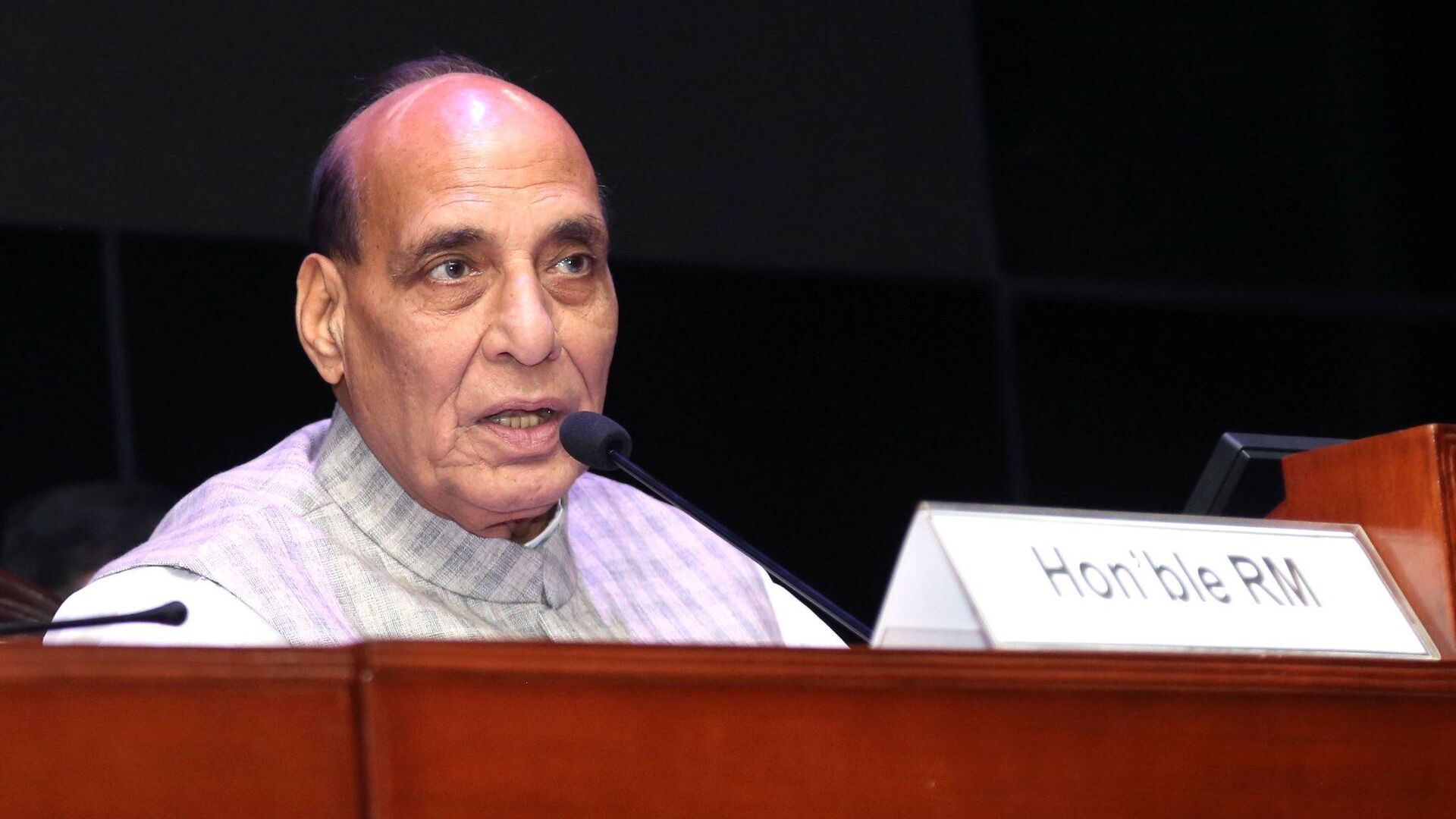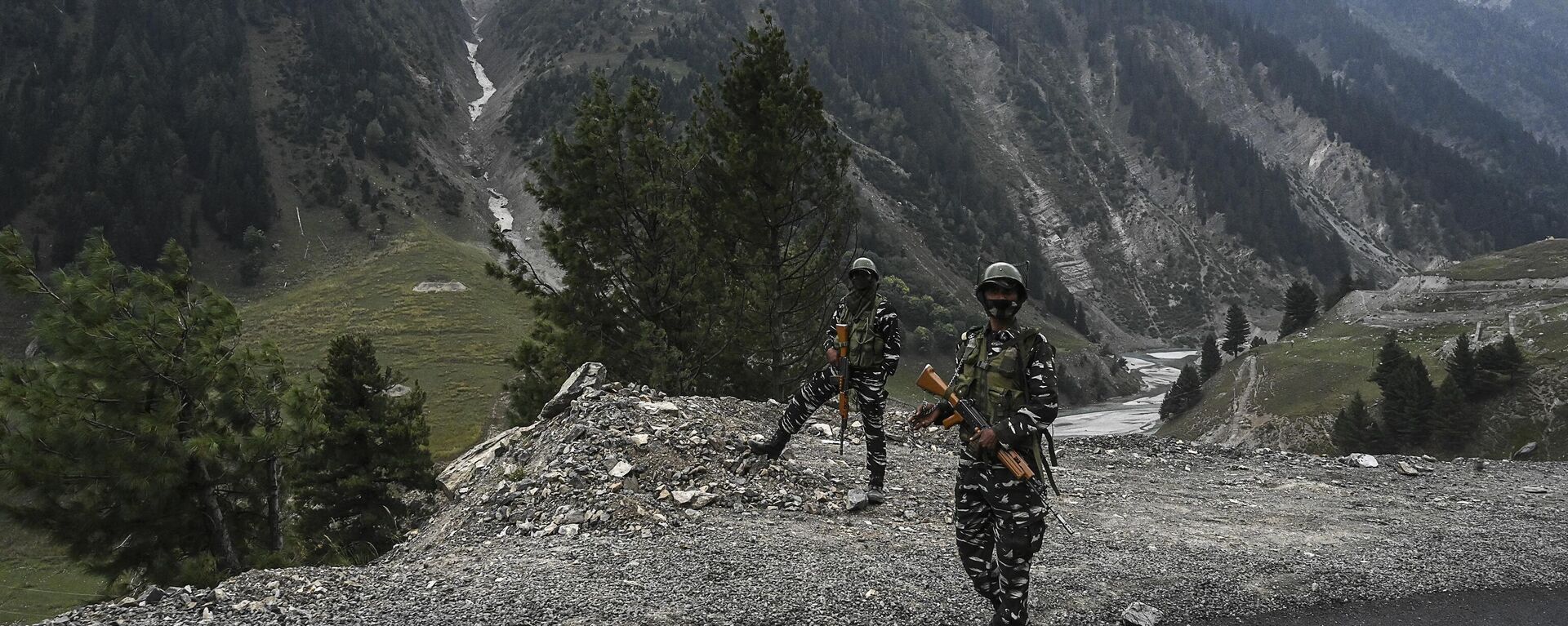https://sputniknews.in/20230427/sco-defense-ministers-meet-in-delhi-what-to-expect-1709780.html
SCO Defence Ministers' Meet in Delhi: What to Expect?
SCO Defence Ministers' Meet in Delhi: What to Expect?
Sputnik India
Rajnath Singh will chair the Shanghai Cooperation Organisation (SCO) Defence Ministers’ Meeting in New Delhi on Friday. 27.04.2023, Sputnik India
2023-04-27T15:44+0530
2023-04-27T15:44+0530
2023-04-27T18:46+0530
sputnik opinion
shanghai cooperation organisation (sco)
new delhi
pakistan
china
jammu and kashmir (j&k)
central asia
afghanistan
daesh (isis/is/islamic state)
taliban
https://cdn1.img.sputniknews.in/img/07e7/04/13/1615847_0:89:2048:1241_1920x0_80_0_0_1d62f8fe6e12979d03e17746a9902474.jpg
Singh's counterparts from Russia, China Kazakhstan, Kyrgyzstan, Tajikistan, and Uzbekistan are already arriving in the Indian capital for the high-level meeting. Sputnik reached out to Dr. Alexey Kupriyanov, expert in South Asia and Indian Ocean studies at the Russian Academy of Sciences, for details about the forthcoming meeting and hot topics on the SCO agenda.First China Visit After Galwan ClashChina's defence minister is going to India for the first time since Indian and Chinese troops clashed in the Galwan Valley.According to Dr. Kupriyanov, the Indo-Chinese relationship is slowly returning to normal after the 2020 border skirmishes, although it is still too early to speak of a normalisation of ties regarding the ongoing border dispute.Note: the Sino-Indian border stalemate, which began in May 2020, is still ongoing at numerous friction areas in the Himalayan region of Ladakh. The two sides have held 18 rounds of talks, but problems at Depsang in the Daulet Beg Oldi sector and Charding Nullah Junction (CNJ) in the Demchok sector persist.As of today, a large part of the 832-kilometre Line of Actual Control (LAC) — the de-facto border between India and China — is not demarcated on the ground, resulting in overlapping claims by both nations. India wants to resume patrolling in these overlapping areas, which have been under suspension since June 2020 skirmishes.Apart from that, there is a long-standing territorial dispute between the two neighbors over the ownership of nearly 90,000 square kilometres in the northeastern state of Arunachal Pradesh.Indo-Pakistan Ties Unlikely to Change in Near FutureOn Wednesday, Islamabad informed that the Pakistan defence chief Khawaja Asif will be joining the meeting in Delhi via videoconference.Regarding relations with Islamabad, Dr. Kupriyanov noted that the situation will remain unclear until the elections in the country: the current political situation remains unstable and the government is unlikely to move forward with any foreign policy initiatives, especially concerning India.Challenges That SCO Member States ShareIn view of mutual accusations of terror abetment by India and Pakistan, intelligence sharing on terrorism is hampered, because the countries are not willing to share sensitive information on the issue, Dr. Kupriyanov explained. At the same time, Russia continues to cooperate with all member states on counter-terrorism operations in the region.The world is watching the new Taliban* government in Kabul: on the one hand, they have managed to avoid the disaster that everyone had feared — that the Taliban would launch a massive crackdown on their political opponents and a wave of refugees would flood nearby countries, or even worse — that the Taliban would start expanding beyond the borders of Afghanistan, Dr. Kupriyanov said.However, the Taliban has not been that easy to negotiate with, either: this concerns their policies towards Afghan women and failure to eliminate the Daesh** threat in the country.How Can SCO Foster Peace in the Region?Regarding the prospects of further boosting trade and eliminating security threats in the SCO region, Dr. Kupriyanov suggests the following:At the same time, Dr. Kupriyanov noted that just the fact that the SCO continues to develop and even attract new partners is significant, given that member states are engaged in geopolitical disputes and have to deal with Western sanctions.* under UN sanctions for terrorism** banned in Russia and many other states
https://sputniknews.in/20230425/speed-up-settlement-of-ladakh-dispute-beijing-says-ahead-of-defence-ministers-india-visit-1678140.html
new delhi
pakistan
china
jammu and kashmir (j&k)
central asia
afghanistan
Sputnik India
feedback.hindi@sputniknews.com
+74956456601
MIA „Rossiya Segodnya“
2023
News
en_IN
Sputnik India
feedback.hindi@sputniknews.com
+74956456601
MIA „Rossiya Segodnya“
Sputnik India
feedback.hindi@sputniknews.com
+74956456601
MIA „Rossiya Segodnya“
shanghai cooperation organisation (sco), new delhi, pakistan, china, jammu and kashmir (j&k), central asia, afghanistan, daesh (isis/is/islamic state), taliban, dedollarisation
shanghai cooperation organisation (sco), new delhi, pakistan, china, jammu and kashmir (j&k), central asia, afghanistan, daesh (isis/is/islamic state), taliban, dedollarisation
SCO Defence Ministers' Meet in Delhi: What to Expect?
15:44 27.04.2023 (Updated: 18:46 27.04.2023) Rajnath Singh will chair the Shanghai Cooperation Organisation (SCO) Defence Ministers’ Meeting in New Delhi on Friday.
Singh's counterparts from Russia, China Kazakhstan, Kyrgyzstan, Tajikistan, and Uzbekistan are already arriving in the Indian capital for the high-level meeting.
Sputnik reached out to Dr. Alexey Kupriyanov, expert in South Asia and Indian Ocean studies at the Russian Academy of Sciences, for details about the forthcoming meeting and hot topics on the SCO agenda.
First China Visit After Galwan Clash
China's defence minister is going to India for the first time since Indian and Chinese troops clashed in the Galwan Valley.
According to Dr. Kupriyanov, the Indo-Chinese relationship is slowly returning to normal after the 2020 border skirmishes, although it is still too early to speak of a normalisation of ties regarding the ongoing border dispute.
"This doesn't mean any breakthrough regarding the situation on the border [between India and China] has been achieved," he said. "The dialogue is underway, confidence-building measures continue to develop, but nothing serious happened. That is, it is rather evidence that the dialogue has been resumed, not yet at the same level, not in the same tone as it was before Galwan clash. But, at least, this is still a step forward, of course."
Note: the Sino-Indian border stalemate, which began in May 2020, is still ongoing at numerous friction areas in the Himalayan region of Ladakh. The two sides have held 18 rounds of talks, but problems at Depsang in the Daulet Beg Oldi sector and Charding Nullah Junction (CNJ) in the Demchok sector persist.
As of today, a large part of the 832-kilometre Line of Actual Control (LAC) — the de-facto border between India and China — is not demarcated on the ground, resulting in overlapping claims by both nations. India wants to resume patrolling in these overlapping areas, which have been under suspension since June 2020 skirmishes.
Apart from that, there is a long-standing territorial dispute between the two neighbors over the ownership of nearly 90,000 square kilometres in the northeastern state of Arunachal Pradesh.
Indo-Pakistan Ties Unlikely to Change in Near Future
On Wednesday, Islamabad informed that the Pakistan defence chief Khawaja Asif will be joining the meeting in Delhi via videoconference.
Regarding relations with Islamabad, Dr. Kupriyanov noted that the situation will remain unclear until the elections in the country: the current political situation remains unstable and the government is unlikely to move forward with any foreign policy initiatives, especially concerning India.
Challenges That SCO Member States Share
In view of mutual accusations of terror abetment by India and Pakistan, intelligence sharing on terrorism is hampered, because the countries are not willing to share sensitive information on the issue, Dr. Kupriyanov explained. At the same time, Russia continues to cooperate with all member states on
counter-terrorism operations in the region.
Afghanistan Peace Efforts The world is watching the new Taliban* government in Kabul: on the one hand, they have managed to avoid the disaster that everyone had feared — that the Taliban would launch a massive crackdown on their political opponents and a wave of refugees would flood nearby countries, or even worse — that the Taliban would start expanding beyond the borders of Afghanistan, Dr. Kupriyanov said.
However, the Taliban has not been that easy to negotiate with, either: this concerns their policies towards Afghan women and failure to eliminate the Daesh** threat in the country.
"Afghanistan seems like a 'frozen' danger: the situation is not critical yet, but there is a potential threat in the future — that is what we should keep in mind," Dr. Kupriyanov believes.
How Can SCO Foster Peace in the Region?
Regarding the prospects of further boosting trade and eliminating security threats in the SCO region, Dr. Kupriyanov suggests the following:
finding solution to the Indo-Chinese border dispute; countering US economic pressure in the region through joint infrastructure and trade projects. "[Regional] trade is still very much tied to the dollar. This is really an issue, because of the fact that the US has begun to use the dollar as means of pressure, and it, of course, greatly interferes with regular trade," Dr. Kupriyanov warned.
At the same time, Dr. Kupriyanov noted that just the fact that the SCO continues to develop and even attract new partners is significant, given that member states are engaged in geopolitical disputes and have to deal with Western sanctions.
"All the current issues are transient. We all live here next to each other, and the SCO is a very good format for maintaining and establishing a dialogue on issues that concern everyone [in the region]," the expert concluded.
* under UN sanctions for terrorism
** banned in Russia and many other states


